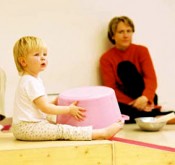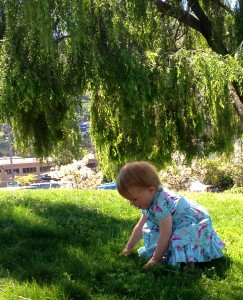Waldorf News
Inadequacy as a Doorway to Learning

By TERRY ELLIS and CHIP ROMER
Imagine a young child learning to stand for the first time. He has seen his older sister do it countless times, and he is determined that he, too, will stand and then walk towards the things that interest him. He crawls to the coffee table and pulls himself into an upright position, then his legs wobble and he promptly falls back onto his bottom. He pulls himself up again, and falls again. Again, and again. The wise parent watches without intervention, ensuring safety but not interrupting the learning that is going on. The child may become distracted at times, but he will keep trying until he is eventually standing solidly and walking confidently towards his interests.
At no time in this learning process did the child feel inadequate about his initial inability to stand and walk. He simply intended to stand and kept trying until he was successful. While he may have become frustrated, the young child does not possess the self-awareness to feel inadequate. He simply directs his will towards that which he wants to achieve, and, through trial and error, eventually gains mastery. As parents watching this effort, we might be struck by the vulnerability of our child or by his heroic perseverance, yet he isn’t feeling vulnerable or proud of his determination. He simply wants to stand and walk.
 For the young child, inadequacy is a way of life. Fueled by curiosity and desire, he is continually learning how to manipulate his body and how to interact with his environment. Inevitably, in our culture there comes a time when a child becomes self-aware in relation to the rest of the culture and its norms. The child becomes aware of his inadequacy. Shame is born, and with it a sense of vulnerability. Metaphorically, this can be seen as “the fall” from the paradise of early childhood.
For the young child, inadequacy is a way of life. Fueled by curiosity and desire, he is continually learning how to manipulate his body and how to interact with his environment. Inevitably, in our culture there comes a time when a child becomes self-aware in relation to the rest of the culture and its norms. The child becomes aware of his inadequacy. Shame is born, and with it a sense of vulnerability. Metaphorically, this can be seen as “the fall” from the paradise of early childhood.
In Waldorf education, there is a conscious intention to delay this onset of self-judgment, a desire to “keep children young” so that unself-conscious desire for learning can endure. This is one reason that Waldorf educators hope to protect children from media exposure, where commercial content creates premature desires and judgments within children. This is a reason why Waldorf educators discourage the photographing and videotaping of children in their schoolwork and play—seeing themselves in pictures or on the screen awakens self-judgment; rather than remembering the joy of playing the lion in a second-grade play, the child watching a video of that play is likely to measure the quality of her performance against that of her classmates. This invites self-judgment; and feelings of inadequacy, vulnerability and shame enter into the young child’s life.
In our heroic culture, our common defense against the shame of inadequacy is to establish expertise. A ten year old who has yet to master riding a bike decides he “doesn’t like bikes” and becomes an expert skateboarder instead. He diverts attention away from the shame of his inadequacy and toward his expertise. As adults in this culture, we continually fix ourselves into areas of competence or expertise in order to protect against shame—and this stunts learning, which by its nature is dynamic, experimental and includes failure.
By focusing on what we know already—by becoming experts—we learn not to learn. As experts, we live only in the well known. We do not explore the frontiers of our comfort zone, where learning—exploring something new and unfamiliar—necessarily occurs; instead, we remain in our defended expertise. Rather than learning, we end up static, repeating that which we already know.
 Turning away from shame has become an entrenched neural pathway—biologically for individuals in our culture, and metaphorically for our culture itself. We default to our comfortable expertise without even thinking about it. Our aversion to the shame of inadequacy is so habitual that it creates a kind of trance state. This trance obscures the need to grow and learn. The trance blocks natural—childlike—excitement for the discovery of the unknown. It is as if the young child has decided he is content to be an expert crawler and denies any interest in learning to walk. We habitually settle for the static safety of familiarity instead of expanding through our inadequacy towards the unknowns where expansive learning lives.
Turning away from shame has become an entrenched neural pathway—biologically for individuals in our culture, and metaphorically for our culture itself. We default to our comfortable expertise without even thinking about it. Our aversion to the shame of inadequacy is so habitual that it creates a kind of trance state. This trance obscures the need to grow and learn. The trance blocks natural—childlike—excitement for the discovery of the unknown. It is as if the young child has decided he is content to be an expert crawler and denies any interest in learning to walk. We habitually settle for the static safety of familiarity instead of expanding through our inadequacy towards the unknowns where expansive learning lives.
In groups (schools, businesses, charter school development teams), expertise resides at the fixed center, and learning—with its requisite inexpertise, uncertainty and inadequacy—lives on the periphery. A group tends to rely on the competence and confidence of its central experts. Group learning, however, is a dynamic process and is best served by the most sensitive member, often the most marginal or peripheral member, speaking about her sensitivity. This act names the shame that lies at the center of the trance of expertise; once that shame is named the trance is broken, inadequacy can be explored and learning can occur for the whole group. The sensitive “inexpert,” much like a child, lives on the periphery of the culture—the frontier of inadequacy; when her process of discovering the unknown—learning—is shared with the center, the whole group culture learns.
In our culture of expertise, the very process of learning has been scapegoated because it requires the dismantling of expertise, which brings with it exposure to the shame of inadequacy. Innovative charter schools are seen as experimental laboratories, whereas mainstream schools tend to be fixed in their established expertise. Charters live on the periphery of public education, pushing the boundaries through experimentation—and commonly experiencing inadequacy—in order to grow and support new learning. They are often scapegoated by the mainstream because they threaten the cultural trance of defended expertise. Charter schools inspired by Waldorf education are currently on the periphery of the traditional Waldorf culture, and their willingness to experiment on the edge can sometimes be seen as threatening.
Attuning our sensitivity to our own inadequacies awakens us to learning opportunities. When we feel ourselves pressing against our inadequacies, we are on the edge of something we do not know but are ready to learn. Rudolf Steiner, in founding the first Waldorf school in 1919, placed teachers outside of their field of expertise: the mathematician taught language arts; the artist taught science. Steiner believed that teachers striving beyond their expertise—or living dynamically with their inadequacies—would serve children as the best examples of learning how to learn. Whether we are educators, charter school developers, parents or mentors, we too can model how to learn by summoning the courage to live in the dynamic tension of our inadequacy. Expansion—individual and cultural—will be our reward.
Terri Ellis and Chip Romer were lead developers of Credo High School in Sonoma County, California, where Chips is currently Executive Director and Terri is a board member. For more information, visit www.credohigh.org.
 Transforming Voices Worldwide
Transforming Voices Worldwide Grade Level Training in Southern California
Grade Level Training in Southern California Waldorf-inspired Homeschool Curriculum
Waldorf-inspired Homeschool Curriculum Train to Teach in Seattle
Train to Teach in Seattle Space speaks. Its language is movement.
Space speaks. Its language is movement. Quality Education in the Heartland
Quality Education in the Heartland Roadmap to Literacy Books & Courses
Roadmap to Literacy Books & Courses Caring for All Stages of Life
Caring for All Stages of Life Waldorf Training in Australia
Waldorf Training in Australia ~ Ensoul Your World With Color ~
~ Ensoul Your World With Color ~ Everything a Teacher Needs
Everything a Teacher Needs Full-Time Teacher Education
Full-Time Teacher Education Flexible preparation for your new grade
Flexible preparation for your new grade Grade-specific web courses for teachers
Grade-specific web courses for teachers Immersive Academics and Arts
Immersive Academics and Arts Waldorf Stories for Everyone
Waldorf Stories for Everyone Training in Traumatology & Artistic Therapies
Training in Traumatology & Artistic Therapies Summer Programs - Culminating Class Trips
Summer Programs - Culminating Class Trips Great books for Waldorf Teachers & Families
Great books for Waldorf Teachers & Families Bay Area Teacher Training
Bay Area Teacher Training Bringing Love to Learning for a Lifetime
Bringing Love to Learning for a Lifetime The Journey is Everything
The Journey is Everything Association for a Healing Education
Association for a Healing Education Middle School Science With Roberto Trostli
Middle School Science With Roberto Trostli Jamie York Books, Resources, Workshops
Jamie York Books, Resources, Workshops Preparing Teachers for 2024-25 Grades 1-8
Preparing Teachers for 2024-25 Grades 1-8 RSS Feeds
RSS Feeds